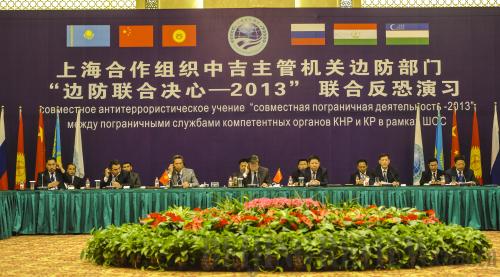|
 |
|
SECURITY COOPERATION: Officials from China and Kyrgyzstan observe an anti-terrorism drill jointly conducted by the two countries through a televideo system in Urumqi, Xinjiang Uygur Autonomous Region, on August 11, 2013 (ZHAO GE) |
On the second to last day of 2013, Xinjiang police announced that eight had died and one more had been arrested during a raid on a group responsible for an "organized and premeditated terrorist attack" in the northwestern Chinese region.
The nine terrorists attacked a police station wielding knives at around 6:30 a.m. in Shache County in Xinjiang Uygur Autonomous Region's Kashgar Prefecture. They also lobbed explosives and set police cars on fire.
According to Xinhua News Agency, at least seven terrorist attacks and two riots happened in Xinjiang in 2013. Last December alone, there were two attacks in Kashgar, leading to 24 deaths, including that of two police officers.
"The surge of terrorist attacks is the results of religious extremism penetrating deeper into the region in recent years," said Ma Pinyan, a senior anti-terrorism researcher and Deputy Director of the Ethnic and Religious Studies Center at the Xinjiang Academy of Social Sciences (XASS).
"If the authorities wish to stop terrorism in the region, they must take efficient measures to prevent the spread of extremist religious ideas," Ma said.
Risks rising
The most notorious terrorist attack in China happened last year on October 28, when a jeep drove into a crowd at Tiananmen Square in downtown Beijing, killing two tourists and injuring another 40. The jeep was driven by Usmen Hasan from Xinjiang, whose mother and wife were also on board during the suicide attack. Police later identified the incident as a premeditated terrorist attack and investigations led to the detainment of five suspects.
"The attack showed that violent terrorist activities are no longer contained to Xinjiang and that terrorists are aiming to strike fear into the hearts of more and more people," said Yang Shu, Director of the Central Asian Studies Institute of Lanzhou University in northwest China's Gansu Province.
According to Xinhua News Agency reports, police found gasoline, two knives and steel rods as well as a flag bearing religious extremist content in the jeep. "The evidence reveals that the attackers were under the influence of religious extremists," Ma said.
Days after the Tiananmen attack, the East Turkistan Islamic Movement (ETIM) claimed responsibility and warned of future attacks.
In 2002, the United States designated the ETIM as a supporter of terrorist activities. In the same year, the UN added the group to its list of terrorist organizations and supporters that are associated with the Al Qaeda network, the group credited with the attack on the Twin Towers in New York City on September 11, 2001.
In recent years, the ETIM, together with other groups associated with terrorism, separatism and extremism, have begun accelerating their penetration into Xinjiang. They promote religious extremism and instigate ethnic hatred through propaganda.
"Religious extremists are dangerous. They promise believers paradise as a way of coercing them into carrying out attacks," said Pan Zhiping, Director of the XASS' Institute of Central Asia.
Pan stressed the difficulty of effectively stopping the spread of such ideologies. "In recent years, the Internet has made the spread of extremist religious materials easier and more convenient," Pan said.
According to a report appearing in the Xinhua-owned Oriental Outlook magazine last November, more than 190 violent terrorist acts were carried out in Xinjiang in 2012, which local police sources say represented a sharp increase from the previous year, but no further details on the exact degree of the increase were given.
Official statistics show that more than 100 organizations or groups acting to endanger state security have been taken down annually by police forces since 2009, the weekly said.
Most people involved in terrorist activities in recent years were born in the 1980s and 1990s, and about 95 percent of them have only received a junior high school education or less. Furthermore, the number of terror-related crimes carried out by small groups or individuals has been on the increase, according to the report.
"Attacks planned by small groups, such as family members, and individuals brainwashed by religious extremist ideologies, rather than larger terrorist organizations, have made it more difficult for police to uncover such plots," Ma said.
Mei Jianming, an anti-terrorism expert with the Beijing-based People's Public Security University of China, agreed that civilian participation in attacks has further complicated the fight against terrorism.
"They appear to be common people when they put down their weapons and it's hard to identify them," Mei said. "It is easy for them to flee as transportation is convenient nowadays."
| 